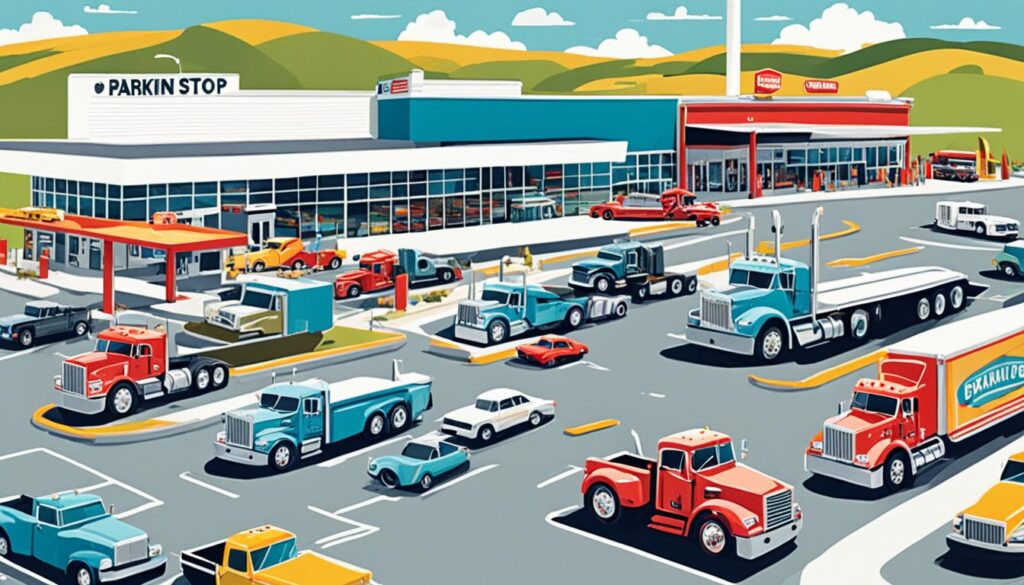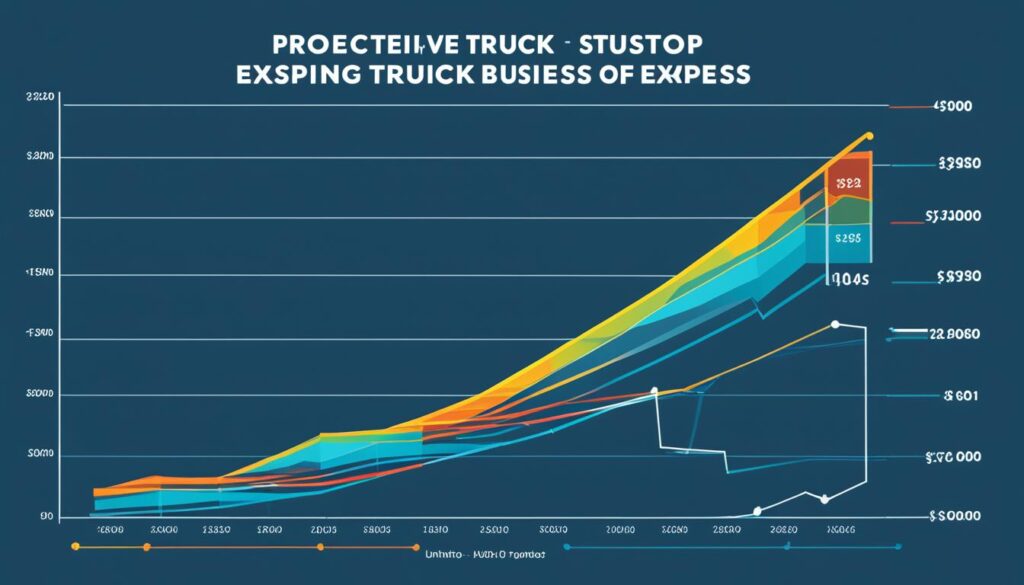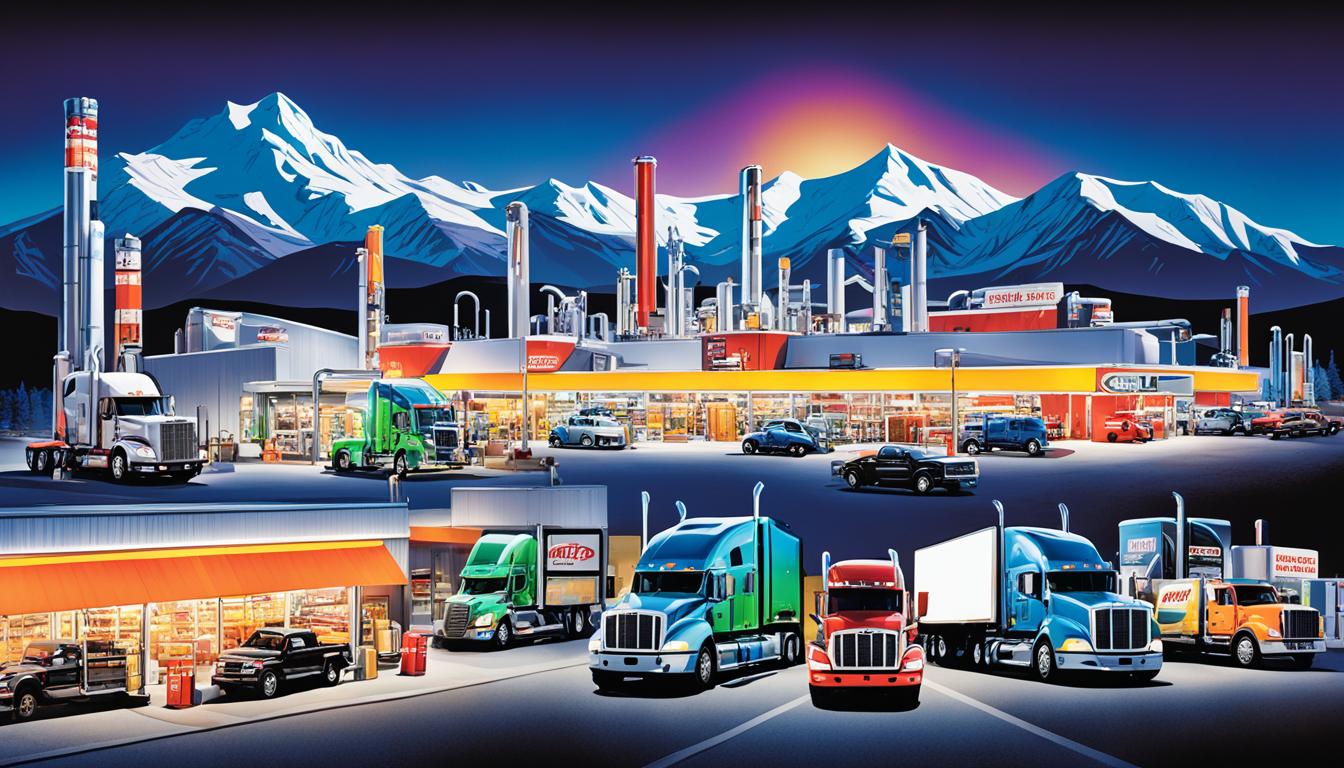Are you ready to dive into the booming truck stop industry? With the U.S. trucking sector making billions, starting a truck stop can be a wise choice. These stops are crucial for America’s logistics, offering vital services to drivers on long trips.
To start a truck stop, you need to find the perfect spot, offer great services, and keep up with trends. This guide will help you launch a successful truck stop, from planning to opening your doors.
The truck stop industry is always changing. You must keep up with new rules, tech, and what truckers need today. By focusing on excellent services and a friendly atmosphere, you can create a business that drivers love to visit.
Key Takeaways
- Choose a strategic location near major trucking routes
- Offer essential services like fuel, food, and rest areas
- Stay updated on industry trends and regulations
- Develop a solid business plan with financial projections
- Create a welcoming environment for drivers
- Consider unique amenities to set your truck stop apart
- Focus on excellent customer service to build loyalty
Understanding the Truck Stop Industry
The truck stop industry is key to moving America’s goods. It’s important to understand the market trends and revenue streams when looking into this business.
Market Trends and Revenue Potential
Truck stops are changing to meet driver needs. They’re growing, with fuel, convenience stores, and restaurants making good money. High-traffic areas can bring in a lot of revenue. Many are adding more services to make more money and draw in customers.
Essential Services for Truck Drivers
To succeed, you must offer key services for drivers. These include:
- Fuel stations
- Food options (restaurants and grab-and-go)
- Rest areas and shower facilities
- Truck maintenance and repair services
- Convenience stores
Importance in the Logistics Chain
Truck stops are vital for logistics. They help long-haul truckers by providing a place to rest, refuel, and restock. By doing this, they keep goods moving across the country. Remember, you’re not just selling fuel and food. You’re offering essential services that keep the economy going.
Choosing the Perfect Location for Your Truck Stop
Finding the right spot for your truck stop is crucial. It can either make your business soar or sink. Let’s look at what makes a location ideal for your truck stop.
Highway Proximity
Your truck stop should be easy to get to from major highways. Look for spots near exits or along busy truck routes. This ensures a steady stream of customers. A well-placed truck stop becomes a key stop for long-haul drivers.

Future Road Plans
Keep an eye on road construction plans in your area. New highways or expansions can increase traffic to your stop. But, rerouting projects might change where vehicles go. Stay updated with local transportation departments for the latest on road works.
Analyzing Competition
Check out the competition in the area. See what services they lack. This can help you stand out. Think about adding unique amenities like a tire shop to draw in more customers. Learn how to start a used tire business as an extra service.
Your truck stop should have:
- Easy entry and exit for large trucks
- Ample parking space
- Room for future expansion
- Good visibility from the road
By focusing on these points, you’ll find a great spot for your truck stop business.
Developing a Comprehensive Business Plan
A solid truck stop business plan is key to success. It should cover your vision, goals, and how you plan to grow. Let’s look at the main parts of your roadmap.
Financial Projections and Funding
First, make detailed financial forecasts for your truck stop. Figure out startup costs, ongoing expenses, and how much money you’ll make. Think about fuel sales, food, retail, and amenities. Then, decide how much money you need and look into loans or investors.

Operational Strategies
Next, plan how to run your truck stop smoothly. Think about who you’ll need to hire, how to manage stock, and using technology. Set goals to keep track of your progress and change your plan if needed. Look for ways to make things better and more efficient over time.
Marketing and Growth Plans
Work on marketing to draw in truckers and fleet operators. Consider loyalty programs, ads, and partnerships with trucking firms. Plan for growth, like expanding or adding new services. Be ready to change your plan as the market changes.
Your truck stop business plan is your guide to success. By focusing on finances, operations, and marketing, you’ll be ready to start and grow your business in this tough industry.
Navigating Legal Requirements and Regulations
Starting a truck stop is more than just picking a good spot. You must deal with many legal rules and regulations. Let’s make it easier to understand.
Obtaining necessary licenses and permits
First, you need the right licenses and permits. You’ll need permits for fuel storage and sales, food service licenses, and business operating licenses. Each state has its own rules. So, check with your local authorities early to avoid problems later.
Compliance with environmental and safety standards
Environmental compliance is strict for truck stops. You must follow rules for fuel storage and handling to protect the environment. Safety standards are also key. Your facility must meet all requirements to keep everyone safe.
Understanding zoning laws and restrictions
Zoning laws are crucial for your truck stop plans. They decide where you can build and what you can do on your land. Before buying land or starting construction, research local zoning laws. This is key to avoid mistakes and ensure your truck stop can legally operate in your chosen spot.
FAQ
What are the current market trends and revenue potential in the truck stop industry?
What are the essential services that truck drivers require at a truck stop?
How important is location when starting a truck stop business?
What should be included in a comprehensive truck stop business plan?
What legal requirements and regulations should be considered when starting a truck stop business?
Author
-

Lucas Martinez is an accomplished entrepreneur with a passion for startups. He has launched and scaled multiple businesses, providing pragmatic advice on starting and growing a business.
View all posts



